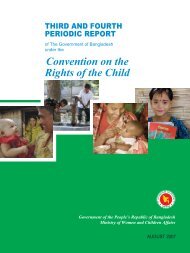Government-funded programmes and services for vulnerable - Unicef
Government-funded programmes and services for vulnerable - Unicef
Government-funded programmes and services for vulnerable - Unicef
You also want an ePaper? Increase the reach of your titles
YUMPU automatically turns print PDFs into web optimized ePapers that Google loves.
<strong>Government</strong>-<strong>funded</strong> <strong>programmes</strong> <strong>and</strong> <strong>services</strong> <strong>for</strong> <strong>vulnerable</strong> children in SA<br />
➔<br />
<br />
of the deceased<br />
contributor may<br />
only apply if there<br />
is no surviving<br />
spouse, or if the<br />
surviving spouse has<br />
not applied <strong>for</strong> the<br />
benefits within six<br />
months of the death<br />
of the contributor.<br />
<br />
be made within six<br />
months of the death<br />
of the spouse or<br />
partner.<br />
Notes:<br />
(i) NCLPA, Annexure A, p81<br />
(ii) Regulations on hazardous work by children in South Africa, <strong>Government</strong> Gazette 32862, 15 January 2010<br />
(iii) Unemployment Insurance Fund Act 63/2001 as amended by the Unemployment Insurance Amendment Act 32/2003<br />
(iv) Black Sash (2010c)<br />
(v) Black Sash (2010c)<br />
Some key policy <strong>and</strong> service delivery gaps<br />
Child labour policies<br />
Almost no data are available on the prevalence of child labour in South Africa. The DoL<br />
estimates that 1 million children between the ages of 5–17 are engaged in child labour<br />
(Presidency 2009: xiii). The practice of child labour is common in <strong>vulnerable</strong> households<br />
affected by poverty, HIV/AIDS <strong>and</strong> households living in rural areas. Families living in<br />
poverty require their children to work, either to supplement the family income or to engage<br />
in domestic chores like caring <strong>for</strong> younger siblings or ill adults. Many children living in<br />
poverty in rural areas are additionally required to fetch wood <strong>and</strong> water <strong>and</strong> herd cattle.<br />
Many children in South Africa, whether employed <strong>for</strong> economic gain or doing domestic<br />
chores, do so at the expense of their education. Child labour can keep children away from<br />
their homework <strong>and</strong> renders them too tired to attend school punctually <strong>and</strong> regularly. In<br />
addition, it is a cause of children dropping out of school.<br />
A participant in an ACESS (2003: 45) child participation process described his experience<br />
as follows:<br />
My problem is I do not even have a chance to read my books. After school I<br />
go to work. When I come back from work I already feel like sleeping <strong>and</strong> I just<br />
sleep because I am tired. I wake up late. I am always late here at school. I’ve<br />
never been early. Another problem is that I am always tired, I am always tired.<br />
(Boy, 12, E Cape)<br />
The Institute <strong>for</strong> Democracy in South Africa has found that many children living in poverty<br />
are compelled to sacrifice their education <strong>and</strong> drop out of school to go <strong>and</strong> work to help<br />
ensure their families’ survival. About half the children interviewed in a research project<br />
182
















